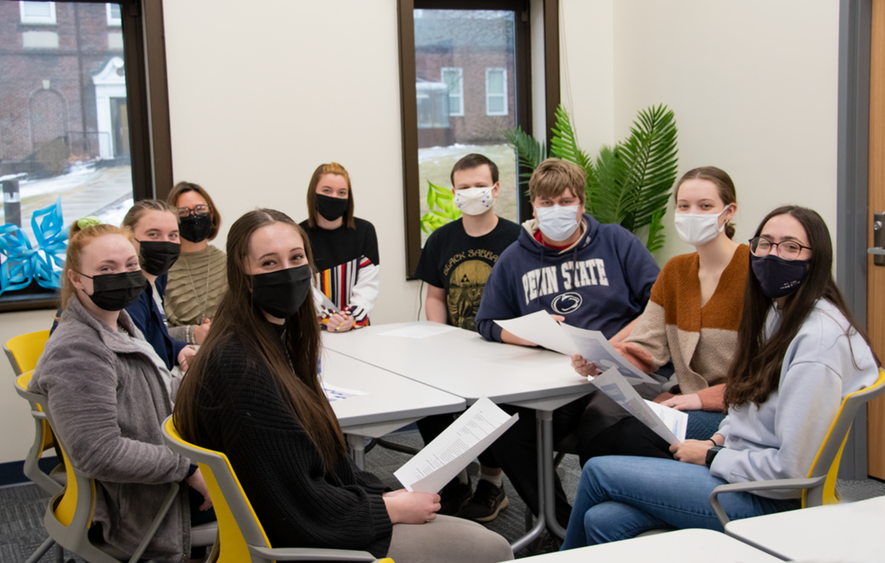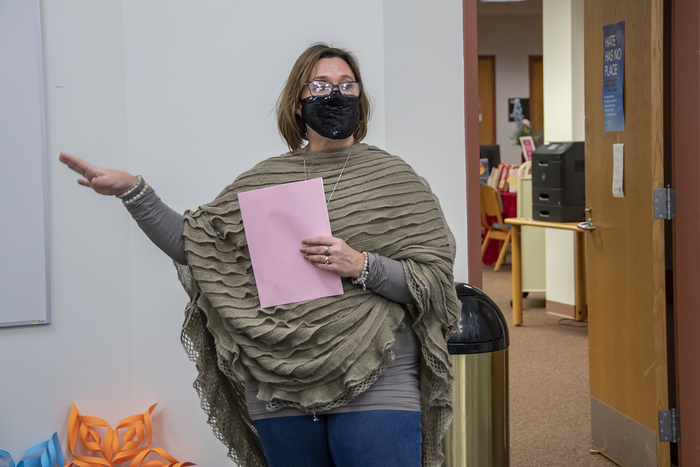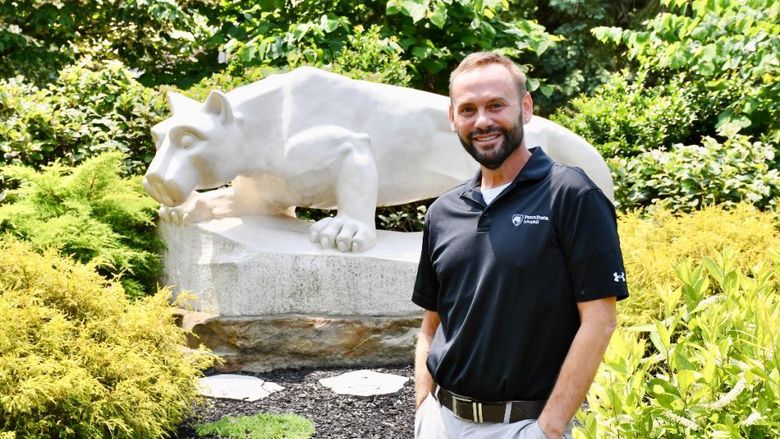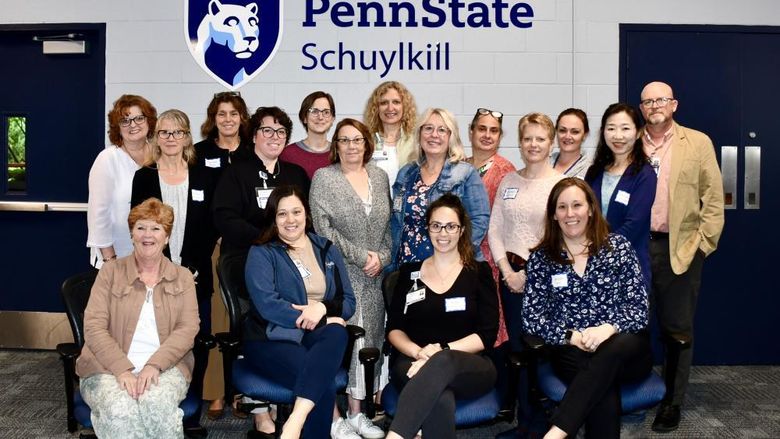
The peer tutoring program at Penn State Schuylkill has been helping students succeed for over 20 years by connecting student tutors with fellow students to reinforce classroom learning. The internationally certified peer tutoring program is a free and easy-to-access resource for all Penn State Schuylkill students, and its benefits to the peer tutors themselves are just as impressive as the benefits to their tutees.
Darlene Young, tutoring coordinator and mathematics instructor at Penn State Schuylkill, said, “Our peer tutors are some of the most dedicated students on campus. They derive so much joy from helping fellow students, and they might even get more out of the experience than the students they tutor.”
Certification that enhances professionalism and effectiveness
The peer tutoring program is certified through the College Reading and Learning Association (CRLA), an international organization of learning support professionals. Certification through the CRLA ensures best practices for academic support programs, a minimum standard for skills and training of tutors, and program feedback from experienced professionals.
The CRLA International Tutor Training Program Certification (ITTPC) certifies training programs at participating institutions that, in turn, certify their tutors and tutor trainers. According to the CRLA website, the purpose of the ITTPC program is to provide recognition of “demonstrated excellence in developing, designing, and implementing vigorous training procedures.”
Tutors earn their individual certification based on the number of training and tutoring hours they complete. For instance, Level I certification demonstrates 25 hours of tutoring and 10 hours of training time. Young notes that many Penn State Schuylkill tutors go on to earn Level II certificates.
Faculty identify program as a win-win for students
Assistant Teaching Professor of Mathematics Nancy Schorschinsky, who teaches remedial and general education math, regards the program as an asset to student success. She includes a recommendation and link to the tutor sign-up portal in her course materials, and at the start of each semester, invites a tutor into her classroom to explain what the program has to offer.
“Due to their diverse needs and situations outside of class, my students need choices to access help,” explained Schorschinsky. “A peer tutor is a valuable option and example for them. Of course, the experience for the peer tutors themselves has multiple benefits: enhanced learning through the process of teaching, empathy, effective communication, and patience.”
The benefits of the program for the peer tutors include:
• Developing a deeper understanding of course materials and study skills/time management;
• Practicing leadership skills;
• Gaining experience that reflects well on resumes;
• Building relationships with other tutors and faculty; and
• Enjoying a flexible work schedule and financial compensation.
Ronald Kelly, assistant teaching professor of criminal justice, also recommends the peer tutoring program to many of his students and acknowledges the program’s benefits for the tutors themselves.
For many students, working with a peer tutor can mean the difference between a B+ and an A, while for others, it can mean the critical difference between a passing or failing grade. Also, tutoring is mutually beneficial learning. When a student communicates the information and knowledge they have attained from class, their understanding of that subject is solidified and broadened. In the end, both students are improving their understanding of the course material.—Ronald Kelly , Assistant Teaching Professor of Criminal Justice
Recruiting new tutors each year
Because the tutoring training program is standardized, new tutors are hired annually during a spring recruitment effort for the upcoming academic year. Potential peer tutors are identified primarily through faculty referrals and recommendations from current tutors who suggest friends and peers as candidates.
Prospective tutors are vetted through an interview process and are required to meet criteria that include an overall 3.0 grade point average, plus a minimum grade of A- and a letter of recommendation from the faculty member in the course to be tutored. Once selected, new tutors complete a one-credit online course, with a current tutor providing one-on-one support and mentoring.
Each August, tutors report for two days of in-person training, where they review ITTPC program certification requirements and other general practice standards. It is also an opportunity to meet and network with other tutors. Subject-specific training for math and English also takes place at the start of the fall semester, and although currently not part of the curricula, science-specific training is in the works.
Third-year psychology student Bethany Haag has been a peer tutor since fall 2020. After receiving the benefit of tutorial assistance in her first academic year, Haag was enthusiastic about becoming a tutor herself.
“I became involved at the Learning Center with the encouragement of [campus registrar] Mike Verhagen,” said Haag. “I saw it as a positive way to give back to my community and peers on campus.”
Not only does Haag tutor courses in psychology and human development and family studies, but she is also an embedded tutor in several classes. As an embedded tutor, Haag audits an assigned course and attends class sessions, ready to help both the instructor and students as needed.
The Learning Center
The peer tutoring program is part of the Learning Center located in the Ciletti Memorial Library. Working alongside Young, Paige Waddell—a recent Penn State Schuylkill graduate and former peer tutor—provides administrative support.
Waddell has been involved with the peer tutoring program for over four years—first as a tutor, then as an office aide. In 2020, the department was part of a reorganization effort while shifting to a remote learning model due to COVID-19. With Waddell months away from earning her bachelor’s degree in corporate communication and the program needing additional staffing, she was asked to remain on staff to help navigate the transitions. Waddell assists Young with the day-to-day administration of the program, helping to promote tutoring services to various campus constituents.
“There have been many changes to the Learning Center since my initial involvement,” stated Waddell. “While it has been challenging, it’s also been a great opportunity. I assist with training new tutors, planning events, spreading awareness about our services, and generally helping the center more effectively serve our students.”
Connecting with the tutoring program
Getting tutoring support
For current students, the Learning Center provides in-person scheduled and drop-in tutoring throughout the week at two convenient campus locations in the Ciletti Memorial Library and the lobby of the Student Community Center, as well as a virtual drop-in option on the weekends. Students are encouraged to schedule an appointment via Starfish—Penn State’s online portal that connects students with learning resources.
Becoming a tutor
Current students interested in learning how to become peer tutors should contact Young at [email protected] now, as the spring recruitment drive is currently underway for the upcoming academic year.






